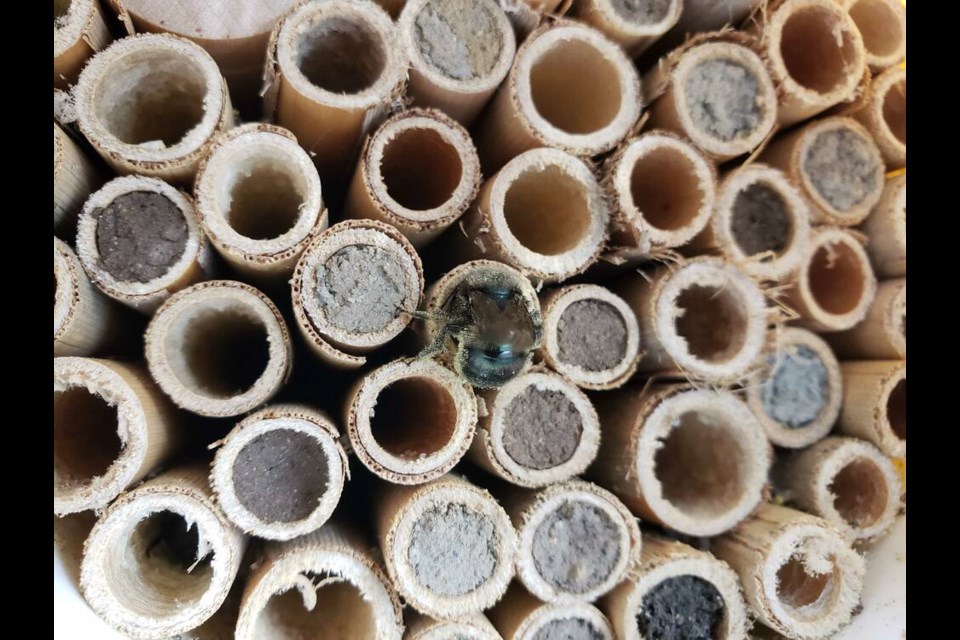Sure, you could adopt a dog, but what about vet bills? Early morning walks in the rain? Drool on your favourite spot on the sofa?
Cats are cool and all, but then there’s the fur all over your sweater collection. Decapitated ‘gifts’ left near the front door. The aloofness.
If you’re looking for a domestic companion but hoping to avoid such woes it might pay to consider raising a more unconventional creature. Have you ever thought about… adopting bees?
A one-year adoption
For the third spring in a row, the West Vancouver Memorial Library (WVML) is encouraging locals to step into the world of beekeeping with its annual bee lending initiative. Participants borrow a Mason Bee Bungalow, a starter home with 10 to 15 live, dormant mason bee cocoons, take it home, and establish their own bee colony.
The bees are “really easy and fun to raise”, and perfect for anyone with a garden, small backyard, or low-rise apartment patio who wants to support the local ecosystem, said WVML's Taren Urquhart.
“Together, we go on a one year journey,” she said.
“You take it home, I tell you where to put it up. I send you newsletters throughout the year. I ask you to observe it, and then I invite everyone back in January and February to a cocoon washing party.”
The returned and washed cocoons are prepared for the next year of registrants, and the students become part of Urquhart’s mason bee alumni — a special community who can call on Urquhart for beekeeping advice or guidance.
The bee knowledge keeper
To say Urquhart has a wealth of bee knowledge would be an understatement; the North Shore native has been raising the little critters for close to 30 years.
Before joining the library Urquhart had ran a small business making homes for mason bees and running pollination programs in schools. Shortly after joining the library in 2016, she worked with the youth department to install a Bee Hotel on to its rooftop garden, a place that would be a sanctuary for the insects and a place for education for library visitors.
The bee lending program had been born out of the pandemic: with the public unable to visit the bees, Urquhart took the bees to the public. She piloted the project with library staff before debuting the official bee lending program, along with an educational online workshop, in 2022.
The workshop is a non-negotiable phase of the program, said Urquhart, equally as important for educating potential bee parents as it is for weeding out those who may not be truly committed.
What is a Mason Bee?
She said she doesn’t expect beginner beekeepers to be as clued up as herself, but they must understand one, key piece of information. The bees they will take home are not your traditional, yellow-and-black striped, Winnie the Pooh-esque honeybees. The fostered bees are Blue Orchard Masons — native to B.C., small, dark blue in colour, and incapable of stinging.
“If that’s all I can get across with this then I know I’ve done well, because those are huge walls of understanding we need to get through. There are just as important bees out there than the ones that make honey,” she said.
“I am not interested in just giving these away willy nilly if they’re not going to be looked after, because it’s not fair to the bees. We as humans are so bad at getting our hooks into nature, and manipulating it and not necessarily doing what’s best for the creatures. So it’s part of my mandate as an educator to make sure people learn about these bees before I give them the bees, and trust them with the bees."
For those who aren’t prepared to take on the responsibility of raising a bee family, there are alternative routes to get acquainted with the pollinators. Bee houses can be found at cemeteries and parks across the North Shore, the result of a woodworking project between the library and the West Vancouver Seniors’ Activity Centre, and the Bee Hotel still takes residence at the library.
There are over 450 different bee species in the province alone, and the blue orchard mason bee can be found from British Columbia to Quebec, explained Urquhart. Hoping to get better acquainted with bees? Simply step outside.
Visit the WVML for more information on its mason bee lending program.
Mina Kerr-Lazenby is the North Shore News’ Indigenous and civic affairs reporter. This reporting beat is made possible by the Local Journalism Initiative.



